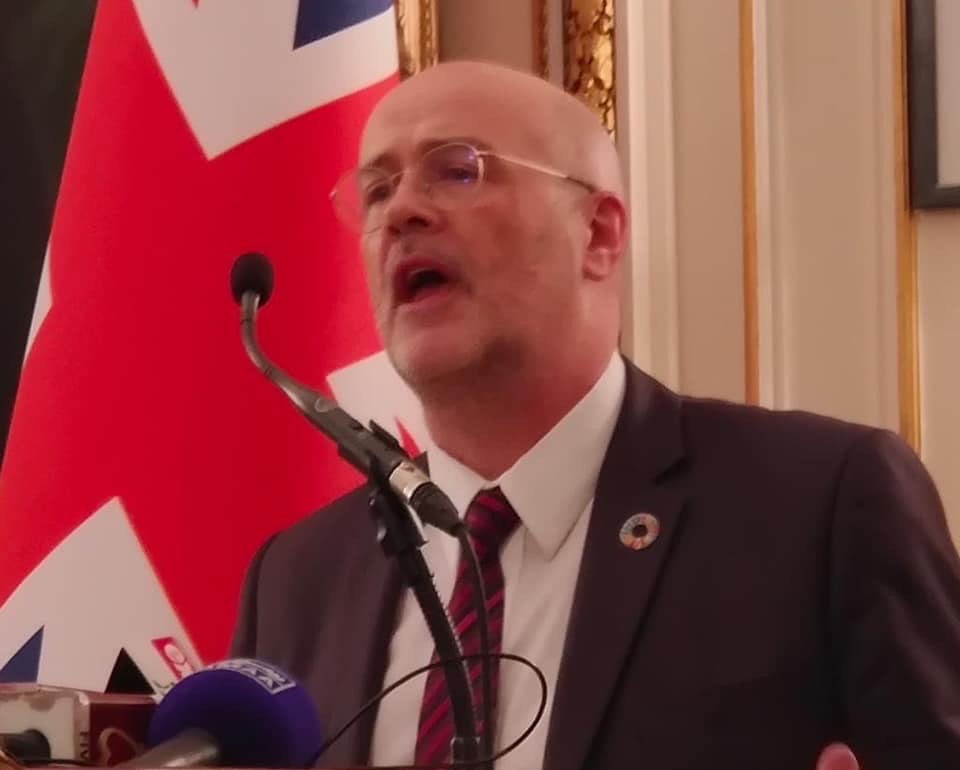John addressed a seminar at the Pakistan High Commission in London on Kashmir Solidarity Day 2020 (above), below his op-ed for The Brussels Times:
The human rights situation in Indian controlled Jammu and Kashmir is self-evidently intolerable for much of the local population. The state of ‘lockdown’ that has applied since August has removed the ability of Kashmiris to communicate with the outside world and removed the gaze on international opinion from the actions of the Indian security forces.
The tactics used in the name of ‘supressing terrorism’ have been well documented in the United Nations Human Rights Council report of June 2018. The conclusions of the report remain disputed by the government of India yet that same Government fails to facilitate independent international observation of the territory. Surely it is self-evident that if the claims of widespread and systematic abuses of human rights are ‘fake news’, as the Government of India claims (and, by the way, as its representatives have claimed to me in person) then opening the whole of Jammu and Kashmir to international observation would reveal the truth.
It is nonetheless hard to see why anyone would wish to invent such claims, nor why any state would lock down part of its territory in this way other than to hide from the world something it did not wish the world to see.
The actions of the Government of Narendra Modi since the Indian general election of 2019 suggest the wind is not blowing in the direction of a consensus-based resolution. Instead the ground has been laid the ground for ‘settlement’, ‘resettlement’, ‘colonisation’ – call it what you will. Seeking to alter the constitutional status of Jammu and Kashmir and the provisions of amendments to the India Citizenship acts demonstrate a discriminatory mindset at the heart of Modi Government singling out Muslims. These actions are a blow at the heart of democratic secular India and, with its actions in Kashmir, damaging to its international standing.
The reactions of the international community thus far have been limited and ineffective. A United Nations position of the status of Kashmir has been in place for more than 70 years, however, it has not proved an effective tool in producing a sustainable settlement. However, the UN HRC report of 2018 was effective in drawing new attention to a problem that, were it elsewhere in the world with different natural resources, would doubtless command greater attention. Unfortunately the UN, the USA (despite a fleeting intrusion into President Trump’s attention span) and the European Union seem happy to ignore Kashmir.
In the context of the European Union’s approach specifically, it is important to understand that the issue of Kashmir was more keenly felt in the UK, the home of two thirds of Europeans of South Asian origin, than elsewhere. Without the UK in the European institutions voices advocating action are now much weaker. The EU, however, still has a potentially productive role to play in nudging the situation in the right direction. First of all, and more obviously without the UK involved, the EU was not part of the imperial power that created the problem, the EU has a limited Kashmiri and South Asian diaspora but it also has a vast and wealthy market to which South Asia nations seek to gain greater and greater preferential access. The leverage of progressive trade agreements and their benefits to emerging economies is significant. EU trade agreements have sought to improve working conditions, apply tests of fairness and look to progress against international conventions and agreements. The GSP+ agreement with Pakistan due for renewal this month has been one such successful agreement that has brought progress and new jobs for Pakistanis, and new export benefits for the EU.
The EU should not hold back from using its economic leverage with the Indian Government and in any new arrangements respect for human rights and conflict resolution must have their place. My fear is that different standards will be applied to the emerging Indian economic superpower than are to its smaller South Asian neighbours. Progressive MEPs need to understand the importance of not doing so and comprehend the dangerous nature of the Hindu populist nationalism of Narendra Modi.
The EU as a leader in the international community should be demanding observer access to Jammu and Kashmir, making clear trade agreements will be conditional on respect for human rights and using its voice to promote conflict resolution.
Two truths remain clear through the fog. One: a sustainable settlement to the Kashmir issue would remove a key barrier to both lasting regional peace and accelerating economic development. The other: a sustainable settlement in Kashmir has to be based on the consent of the Kashmiris.
first published: The Brussels Times, 5 February 2020



